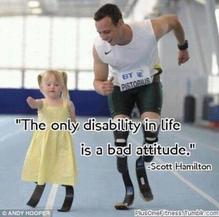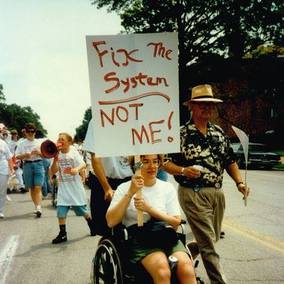
People who stutter are regularly interrupted. Our sentences our finished for us, we are talked over, and skirted in conversations. This can be terribly frustrating and disempowering, not the least because being regularly interrupted causes dysfluent people to internalize this oppression.
Yet it is also noteworthy that Speech-Language Pathology (SLP) describes the stuttering event itself as an “interruption of speech” (e.g. Guitar 2014). At first glance this use of “interruption” seems straightforward. To interrupt someone else’s speech is (as the OED defines “interrupt”) to break the continuity of something in time, to hinder from proceeding with some action, as well as to hinder, stop, prevent, thwart. Yet there is something odd about this formulation when applied to ourselves. To follow out this line of thought, not only are we interrupted by others, but SLP discourse concludes that when we stutter we interrupt—ourselves?
What could this mean? Is it that they think we are interrupting language itself? If so—then whose language? Certainly not our language! I have always spoken with gaps, pauses, prolongations, and repetitions. A stutter is only an interruption of what we think language should sound like: “normally” fluent, able-bodied speech.[i] One might respond that stutterers interrupt the abstract structure of language and morphology—except that linguistics generally holds language to be both flexible and dynamic.[ii] Communication theory likewise suggests that communication is filled with redundancy and thus far more flexible than we fear.[iii] All this to say that the idea that stuttering is itself an “interruption” is actually far from self-evident, and in fact a much more political and complex statement than we’ve been taught to believe.[iv]
But what does it mean that we both interrupt and are interrupted? Is there a relation between these events? Do people interrupt us because our speech interrupts the script of fluency? Because we interrupt the linear and ceaseless flow of time and information? There is likely truth to the idea that interruptions are attempts to interrupt the dysfluent interruption—to get back to business as usual. But we can take this conversation in a different yet equally plausible direction: thinking about who gets interrupted leads to the question of who is interruptible.
Dysfluent speakers, women, queer and racialized voices don’t just happen to get interrupted; some voices are understood to be interruptible in a way that others are not. That is, the problem is not exactly that some voices are just louder or more authoritative than others and thus get heard, while other voices that break the (apparently fragile!) flow of speech or that have distinct features (such as “uptalk”) don’t demand attention. The issue, rather, is always power dynamics between marginalized and privileged peoples.
For example, in November 1970, the Globe and Mail published a curious piece entitled “Stammer Becomes Fashionable: Essential Mark of the English Gentleman,” an exposé of a wildly counter-intuitive British phenomenon. The cultivation of a distinguished, yet fake, stammer is described as indicating good breeding and fashion. Speech impediments in the British Parliament were reportedly displayed commonly and unashamedly, and the article details stammering as a passport to elite circles, a means of holding a listener’s attention so one’s words are appreciated more. This strategy was developed early in certain private school traditions. “In the more extreme cases,” explains Oxford professor David Jenkins, “it’s a very visible affectation. It’s also a sign of complete self-assurance. You take your time, knowing you are master of the situation.”[v]
Stuttering in this case was oddly used to control conversations; the stutter that stretches time and makes others uncomfortable becomes a symbol demonstrating that social elites are masters of the situation—that they are not interruptible.
The irony is painful but offers an important lesson: dysfluent voices are not interrupted simply because stuttering “interrupts speech.” The issue, rather, is one’s position within relations of power. For the fashionable stammerer, stuttering became a manifestation and performance of high social status. Today, we are taught to limit our stuttering for the exact same purpose.
There are two broad conclusions we can draw from this reflection.
1) To understand interruption and dysfluency we must move past the SLP discourse of stuttering “interrupting speech” to think about power and ableism. If stuttering interrupts, it interrupts not speech nor communication but ableist norms of speech that are rooted within our social, cultural, political, and economic worlds. How can this power to interrupt be used critically to cultivate community and resistance? This question is important since the capacity to interrupt is always linked with power and is thus dangerous. For example, the French novelist and stutterer Patrick Modiano appeared on a prominent French television show; displaying his admiration for Modiano, Jacques Derrida later reflected that, “he’s managed to get people to accept that they need to be patient when he can't find his words. . . . There’s someone who has succeeded in transforming the public scene and forcing it to go at his own speed” (479). Derrida’s wording, “forcing [the audience] to go at his own speed,” is quite ambiguous. Is Modiano, like the fashionable stammerer, taking control of the conversation, interrupting fluency as a way to master conversation? Or is his interruption an invitation into a different rhythm and tempo that transforms the public scene? These are very different practices that lead towards very different politics.
2) The example of the fashionable stammerer highlights the possibility that being interrupted—being interruptible—has little to do with the manner in which phonemes exit one’s mouth. It is of course true, as Chris Constantino argues in his Foucauldian work on passing-as-fluent, that fluent privilege can be emulated and used to leverage one’s social position—though as many of us know, truly passing as fluent is always precarious for the stutterer and often more stressful/dangerous than it’s worth. The fashionable stammerer is evidence that in a different social context, stuttering came to mean something else entirely, a sign of privilege rather than pity. It is evidence that fluency and normalcy are always stacked games played against marginalized peoples.
To conclude, we are interrupted and seen as interruptible not due to the distinct characteristics of our voices and patterns of our speech but because stuttering has been framed as an interruption. We are interrupted because the power to interrupt belongs to those with social power and is seen as grotesque in our dysfluent bodies. The “fashionable stammerer” may have been a historical oddity, but social expectations around who gets to take up time when communicating remains coupled with privilege.
It is difficult to know the best response. Interruption is an incredibly complex event and practise marked by as many pitfalls as possibilities. One perhaps obvious response is to refuse the idea that disabled speech is an interruption of speech and communication. This is our dysfluent mode and rhythm of communicating. We neither aspire nor pretend to be fluent so at this level there is nothing to interrupt and nothing to be interrupted. We should, if we desire, finish our sentences and block visibly while others attempt to carry on the conversation without us. This would be a start.
But of course dysfluency is an interruption, just of a very different kind than imagined by SLP. Dysfluency transgresses ableist norms of what language should sound like, how social time should be occupied, and the place of disabled peoples within society (i.e. if not assimilated then cheerfully working towards a cure or rehabilitation). From this perspective we might begin to imagine how to use dysfluent interruption as a critical practise. How can interruption confront and transform communicative privilege and the ableism that structures our lives? How can dysfluency help to critically interrupt political norms and structures by which some people are deemed “interruptible”? If this is a much bigger challenge than refusing the idea that stuttering “interrupts speech” it is because the political reward is likewise far greater.
-Josh
[i] Both normalcy and fluency are fictions that quasi-exist in the way that statistical averages exist.
[ii] That stuttering stretches language and expresses variation is obvious; or, in theoretical terms, Deleuze might say that dysfluency composes a “minor grammar.”
[iii] Some communication contexts have little to no redundancy and are thus highly susceptible to interruption and error (for example, an air traffic controller). The point is that the vast majority of communicative relations could be reconfigured to make space for dysfluency if not governed by ableist protocols. Yet admittedly, what people likely mean is more straight-forward: stuttering interrupts the spontaneous or “natural” flow of meanings exchanged between people (as one of our commentators has said, stuttering can feel like being caught in a traffic jam in rush hour). This intuitive idea highlights an additional meaning of “interrupt”: stuttering seems to thwart our intended meanings and purposes within communicative events (as, of course, they unfold in fluent time). I am apparently a self-interrupting speaker. However, not only, as Zach has previously argued, might we find that we can stutter more “spontaneously” (in Chris Constantino’s terms) from a position of dysfluency pride and activism, but we must remember that language always unfolds in time, and communication is never instantaneous. The idea of being "thwarted" is, in this context, always framed by a fiction of fluency that does not exist.
[iv] At the same time, it is important to note that nearly all of these modes of interruption (which I have cast doubt upon) are precisely what SLP, a medical-industrial complex, has in mind when it frames dysfluency as an interruption. The stuttering event interrupts speech when considered linguistically, phonetically, communicatively, socially, temporally, economically, etc. etc. The fear of interruption is ubiquitous, perfectly evidenced in how SLP thinks about speech and its powers as incredibly fragile. Not only blocks and hesitations—the obvious candidates for an interruption—but repetitions, prolongations, and modulated flow of the voice are defined as interruptions. Why? Because they apparently carry no meaning and thus pose as, at best, an irritation and, at worst, a threat. However, as all of us have discovered when we’re among listeners that truly appreciate and make time for our voices, the voice, speech, language, and communication are far more robust and resilient than SLP seems to imagine.
[v] Israel Shenker, “Stammer Becomes Fashionable: Essential Mark of the English Gentleman,” The Globe and Mail, November, 1970, 12:12, Toronto.




 RSS Feed
RSS Feed
